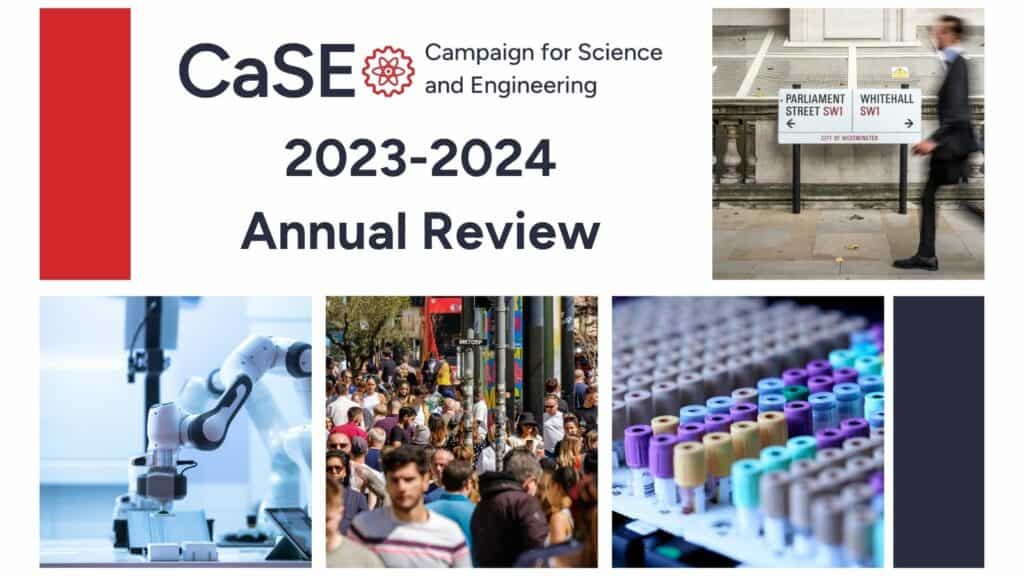Hello and a warm welcome from me too. It’s a real pleasure to see you all. Thank you for attending our AGM.
CaSE in 2022 – Director’s address to the AGM
22 Nov 2022
Executive Director Professor Sarah Main gives her report on CaSE's activities and successes at the 2022 AGM on 15th November.

My role in this AGM is to reflect on CaSE’s activities and achievements over the last year. Let me start by saying how proud I am of the CaSE team for what they have achieved this year and thanking every one of them. CaSE achieves a huge amount, and it does so through the very talented people in the CaSE team.
I’d like to take a moment to consider the environment in which we have been working over the last year. This has been a year of frenetic activity in politics and yet a hiatus in science policy. The long summer of intrigue in the Conservative party leadership masked a stasis in Government. A CaSE press release from December of last year could be re-issued today: ‘CaSE calls on government to make association with EU research programmes a priority’. At the Spring Statement in March, CaSE welcomed reform of R&D tax credits and reiteration of the Government’s R&D investment targets, but warned of inflationary erosion and the risk of losing steam in a worsening economy. I look forward to the same Rishi Sunak locking in the Government’s commitment to R&D now as Prime Minister at the Autumn Statement this week. But none of us can be complacent about that commitment. I think it is testament to the year’s turmoil that only this time last year were those commitments, for three year rises in R&D investment, set out in the Spending Review of 2021.
It is not CaSE’s role to comment on the passage of politics in general, no matter how turbulent or interesting. But it is CaSE’s role to work at the interface with politics to put science and engineering at the heart of the UK’s future. The transitions that we have seen this year in political leadership have shown, once again, how fragile support for R&D is in Government and how significantly it is affected by the ideology of a very few.
Surely we cannot sustain a generational transition to a more research intensive culture and economy with this somewhat breathless pitch for the very principle of R&D-led growth at every change of leader and every fiscal event. We need a long-term, budgeted, commitment to R&D. We need cross-party agreement to sustain that commitment between administrations and within parties. We need to persevere when such strategies stumble.
Why is it that an unerring, long-term commitment is so difficult to achieve?
Perhaps it is because we lack an ideology of R&D. I firmly believe that R&D delivers benefits for people: in the outcomes and products of research and innovation; enriching culture and livelihoods; and enabling more efficient and innovative Government. I don’t think it is incumbent on politicians alone to make that case, but in fact on all of us to help create that narrative.
Projects
I am delighted that CaSE has been driving two major projects this year that I think will help build a more coherent national narrative for R&D. One is the Discovery Decade project and one is our programme examining the skills needs of an R&D intensive UK.
For those who have not heard much about these projects, I will give a quick overview of them now.
The Discovery Decade
The Discovery Decade project aims to help create a compelling vision for R&D in the UK, to attract a broader base of public supporters and ensure R&D investment remains a political priority. The initial focus of the project has been on understanding audiences, crucially by developing an open access, ‘gold standard’ dataset on the public’s current relationship with R&D. This has been a fascinating phase of the work over the last year. We have worked with an agency to conduct a 10,000 person nationally representative poll, comprehensively researching public attitudes to R&D, covering all disciplines, R&D sectors, and parts of the UK. This will be complemented by focus groups delving into the detail across the autumn. The data will be published as an open-access online resource in the first part of next year.
We are now working with our creative agencies to help us translate our audience data into prototype campaign ideas. We’ll be sharing these with the sector over the coming months. This is a project of work that we hope will be collaborative and we are looking to invite and work with partners who are interested in adopting and scaling these ideas in their own work.
Skills needs of an R&D intensive UK
The second project I mentioned is a new piece of work to examine the skills needs and requirements across the R&D landscape. This is in the pursuit of advancing the skills dimension of the transformation of the UK into a more research and innovation intensive country. CaSE has worked in the area of education and skills for many years, but we are not education policy specialists. So, we have been reaching out and working with other organisations and stakeholders who are leading experts in the field to help us look across the many dimensions of skills in the UK. This builds on our own work from last year, our ‘Inspiring Innovation’ report, with a view to creating a holistic picture of skills needs that identifies some of the cross-cutting challenges and pinch points in policy.
To this end, we have been convening our members and other stakeholders to consider different areas of skills provision, and identifying those areas where there are bottlenecks. In each area, we will draw together evidence and challenges on the skills needs for an R&D intensive UK. We are really pleased to be working with the Department for Education and the Office for Science and Technology Strategy.
We have already held a roundtable on immigration in partnership with a law firm, we have one coming up on the skills challenges in Scotland, and we have one in a few weeks’ time on reskilling and adult learning in partnership with the Open University.
CaSE Strategy
Not only have we initiated and made huge progress on these two flagship areas of work, but CaSE also published its new strategy back in May of this year. This represented a period of 12 months of work by the CaSE board and team, involving engagement with stakeholders across our membership and the wider sector
Our new strategy has embedded public benefit at the heart of what CaSE does, reflecting an ongoing transition in our work and challenging us to go further in the future. I think we have really seized the moment of this ‘R&D decade’ that we are now in. We have challenged ourselves as CaSE to work with our members, partners and the public to support its success and delivery in a way that improves people’s lives and livelihoods. This strategy will drive CaSE to go further and faster to put science and engineering at the heart of the UK’s future.
Other Work
Mentioning some of CaSE’s other work over the years, I am really delighted that CaSE has been able to get out and about after the period of lockdown and COVID years. We held our first in person roundtable in three years just a couple of weeks ago, and the CaSE team have been attending and running events in Scotland, Wales, and Northern Ireland already this year.
Earlier in the year we published a policy review of Public Sector Research Establishments (PSREs), and their contribution to the research and innovation landscape.
In late spring the Government published its Levelling up white paper, with significant commitments on the use of R&D to promote economic growth and prosperity across the UK. We were delighted that it included significant input from CaSE’s work on the value of R&D investment in driving economic growth, building on our report ‘The Power of Place’.
We have been working hard on advocacy and evidence gathering in the lead-up to the Autumn Statement, and have published a series of pieces highlighting key points we wish the Government to note for this Autumn Statement. We look forward to analysing the outcome of the Autumn Statement in the near future.
Reflections
In a year which has been the hottest year on record and seen Cop27 underway, departmental R&D remains a priority for us at CaSE. I believe this is a somewhat under celebrated area of the UK’s R&D investment, but it is so important that Government uses its R&D capability across departments in a joined up way in order to tackle significant societal issues. Often a cross governmental approach is the only way to make the most of the UK’s science capability. We have seen the National Science and Technology council (NSTC) formed by Boris Johnson, somewhat demoted in stature under Liz Truss, and re-established now as a Prime Ministerial cabinet committee under Rishi Sunak. I am pleased to see these signs of joined up working across government. I look forward to using the breadth of CaSE’s membership to continue being an advocate for the whole of the R&D ecosystem, drawing on the insights of our extensive and diverse membership.
It has been fantastic to have the CaSE membership continue to grow as that rich network, and we’re excited to now include Diamond Light Source, UK Dementia Research Institute, and Advanced Research Clusters (ARC) as part of the CaSE family. Welcome to them.
Thank you to all our members, for your support, energy and involvement over the last year. You enable us to be an informed, evidenced and effective advocate for the sector. I very much look forward to working with you in the year ahead.
Related resources

Lynne Milford reflects on her time as CaSE’s Campaigns and Public Affairs Manager.

Executive Director Dr Alicia Greated gives her report on CaSE’s activities and successes at the 2024 AGM on November 26th.

This year has seen changes to CaSE as an organisation, shifts in the UK political landscape, and important developments for the UK R&D sector.

A General Election year presents a real opportunity for the R&D sector to make our voices heard.